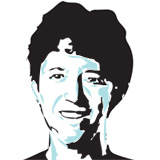The Well-Lived Life
The Columnist's Kind of Heroes
It feels a bit presumptuous to write about Selma Rubin, whose extraordinary life was memorialized by Nick Welsh in the Santa Barbara Independent on March 15. I got to know her only a few years ago, although it was impossible not to have seen and heard of her, given my involvement with various environmental and social justice organizations. She made a powerful impression.
I’d already planned to write this column about Selma, not to describe her accomplishments, but to try to understand how she managed to lead such a long, meaningful, effective life. Then my dad died, just two days after Selma. As I wrote my comments for his funeral service last week and talked to the many people who knew him, I came to see how the two of them offer a common model for a life well lived.

During one car ride back from an SBCAN board meeting, I asked Selma the secret to long life and good health. She said, “Staying active and being happy.” Of course, she made it sound as if one could choose happiness as easily as choosing to be involved. For her I think they actually were equivalent — she intended to be happy, just as she intended that nothing, not even advancing age, would get in the way of doing the things that really mattered to her. Whether it was luck, genetics, or simple force of character that allowed her to manifest her intentions, she accomplished what she set out to do. Even her death went that way: She wasn’t feeling well, went to the doctor, was told her cancer was advancing, decided she was ready to go, and died the next day. No screwing around for Selma.
Selma had a pretty straightforward sense of herself in the world. She saw problems, had ideas for how to solve them, and acted. She was truly courageous, too. She told me the story that Welsh recounted, of being falsely prosecuted for election fraud while organizing the campaign for the ballot measure that would save El Capitan Canyon. She may have been scared, but she didn’t let the Big Money interests and their local puppets intimidate her. She stuck it out, turned the situation to advantage, and won. That’s my kind of hero.
My dad never put himself at personal risk, nor was he a tireless worker for social change as Selma was. But he was a significant figure nonetheless. This was a guy who didn’t just talk; he made things happen. When my stepsister’s recurring brain tumor was deemed inoperable, he used his skills as a “ferocious researcher” (so the Chicago Tribune called him in its obit) to find an alternative form of surgery. During her recovery at the University of Virginia, he met a neurosurgeon who was doing another kind of cutting-edge treatment, saw its potential, and helped the Focused Ultrasound Surgical Foundation to grow exponentially, as its first large donor. He was also hands-on, recruiting big donors, working with vendors, speeding up the transition from potential to real medical treatment. (FUS was featured on ABC World News with Diane Sawyer in January.)
People who met my dad remembered him long after, mostly for the generosity with which he’d offer his intelligence and problem-solving skills to help them achieve their goals. He used to scare the shit out of my friends with his 20-questions approach to a dinner conversation, but they were likely to walk away with great advice or concrete offers of very useful help.
Here’s my dad in a nutshell: He’s just been hospitalized for terrible pain. The night nurse comes in; he starts interviewing her and finds out that her bright, creative 14-year-old daughter is looking at private schools. “Which ones?” he asks. (This from the former president of the Board of Trustees of Francis W. Parker School, his own alma mater.) When his school isn’t on the list, he asks why. “She doesn’t think she can get in,” the nurse replies. So my dad spends the next three night shifts trying to strategize with the nurse about getting her daughter into the school. And here’s the thing: If he hadn’t been so sick, he’d have done it, too.
To steal from the neurosurgeon who spoke at my dad’s funeral and quoted George Bernard Shaw:
“The reasonable man adapts himself to the world; the unreasonable one persists in trying to adapt the world to himself. Therefore, all progress depends on the unreasonable man.”
Here’s what my dad and Selma had in common: They were, by Shaw’s calculus, unreasonable. They had great integrity, believed in nurturing the next generations, and worked hard to leave the world a better place than they found it. If you can find a better recipe than that for a life well lived, let me know.



